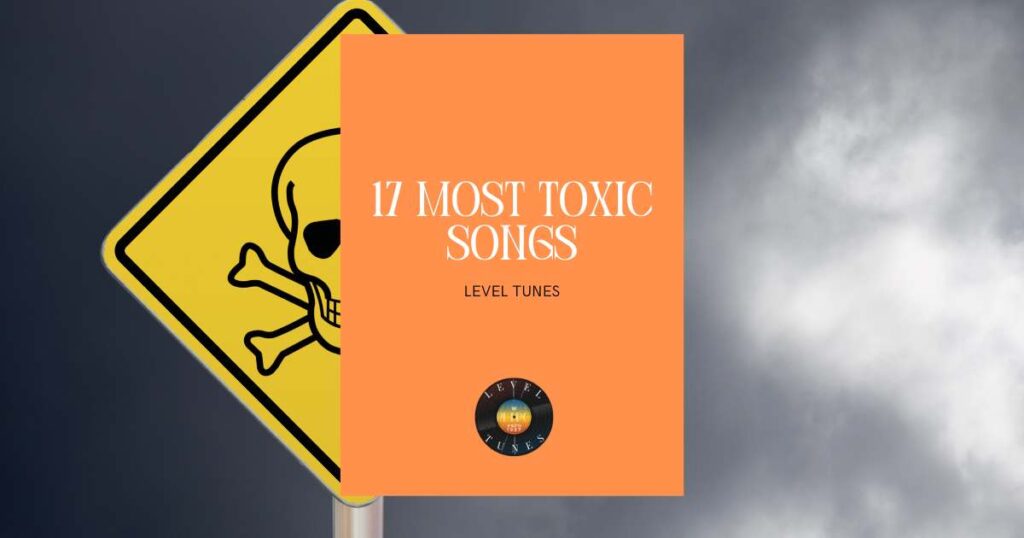17 Most Toxic Songs: 17 Iconic Songs
Hey there, fellow music aficionados! It’s TBone here from Level Tunes, where we live and breathe music. As a DJ and an ardent music lover, I’ve always been passionate about sharing great tunes with you all.
But today, I’m taking a slightly different route. I’ve curated a list of the ’17 Most Toxic Songs’ – and trust me, it’s not what you expect! This isn’t about bad beats or poor lyrics; it’s about songs that have a controversial, provocative edge or have sparked debates over the years.
Why am I doing this?
Because music isn’t just about rhythm and melodies; it’s a powerful medium that reflects and sometimes challenges our values and beliefs.
So, let’s dive in and explore these tracks together, understanding the stories and controversies behind them. It’s a journey through the complex world of music, and I promise it’ll be as enlightening as it is entertaining!
Here are the most toxic songs that you can check out:
List Of Most Toxic Songs
Most toxic songs in a list format:
1. “Blurred Lines” – Robin Thicke (2013)
Album: Blurred Lines
Label: Star Trak Entertainment, Interscope Records
“Blurred Lines” by Robin Thicke, featuring Pharrell Williams and T.I., sparked massive controversy upon its release in 2013. Housed in the album of the same name, the song faced backlash for lyrics perceived as promoting non-consensual behavior. Despite topping charts worldwide, it stirred debates about societal attitudes towards consent. This track is a classic example of how catchy tunes can be overshadowed by problematic themes.
2. “Smack My B**** Up” – The Prodigy (1997)
Album: The Fat of the Land
Label: XL Recordings
The Prodigy’s “Smack My B**** Up” from their 1997 album “The Fat of the Land” was infamous for its provocative title and lyrics. The song faced bans and criticism for promoting violence against women, leading to heated discussions about censorship and artistic expression in music. Despite the controversy, it’s known for its pulsating energy and remains a significant track in the electronic music scene.
3. “Kim” – Eminem (2000)
Album: The Marshall Mathers LP
Label: Aftermath Entertainment, Interscope Records
Eminem’s “Kim” is a chilling narrative from his 2000 album “The Marshall Mathers LP.” The track, a graphic depiction of domestic violence and murder, stirred controversy for its explicit content and portrayal of real-life ex-wife Kim Scott. It’s a stark example of Eminem’s raw storytelling ability, albeit disturbing, and showcases the darker side of his lyrical genius.
4. “Under My Thumb” – The Rolling Stones (1966)
Album: Aftermath
Label: Decca Records
The Rolling Stones’ “Under My Thumb,” from their 1966 album “Aftermath,” raised eyebrows for its lyrics, which many interpreted as misogynistic. The song, encapsulating the era’s gender dynamics, continues to be debated for its portrayal of women. Despite the controversy, it remains a classic in the band’s repertoire, showcasing their distinctive rock sound.
5. “One in a Million” – Guns N’ Roses (1988)
Album: G N’ R Lies
Label: Geffen Records
Guns N’ Roses’ “One in a Million” from their 1988 album “G N’ R Lies” was embroiled in controversy for lyrics that were considered racist and homophobic. The song sparked debates about freedom of speech in music and the responsibility of artists in their lyrics. It’s a provocative piece that continues to incite discussions about the boundaries of artistic expression.
6. “Money for Nothing” – Dire Straits (1985)
Album: Brothers in Arms
Label: Vertigo Records
Dire Straits’ “Money for Nothing” from their 1985 album “Brothers in Arms” became a topic of controversy for its use of a homophobic slur. Despite being a satire on consumerism and television culture, the song’s lyrics led to debates on the appropriateness of language in music. The track, however, remains iconic for its innovative music video and distinctive guitar riff.
7. “Cop Killer” – Body Count (1992)
Album: Body Count
Label: Sire Records
Body Count’s “Cop Killer” from their 1992 self-titled album ignited a firestorm for its explicit content and anti-police sentiment. The song, intended as a protest against police brutality, became a lightning rod for debates on freedom of speech and censorship. Despite the controversy, it is remembered for its raw energy and uncompromising stance on social issues.
8. “Born in the U.S.A.” – Bruce Springsteen (1984)
Album: Born in the U.S.A.
Label: Columbia Records
Bruce Springsteen’s “Born in the U.S.A.” from his 1984 album of the same name is often misunderstood as a patriotic anthem. However, its lyrics actually critique the treatment of Vietnam War veterans and American policy. The song’s misinterpretation and its use in political campaigns have sparked discussions about the gap between an artist’s intention and public perception.
9. “Pumped Up Kicks” – Foster the People (2010)
Album: Torches
Label: Columbia Records
Foster the People’s “Pumped Up Kicks” from their 2010 album “Torches” faced scrutiny for its lyrics about a school shooting. The catchy, upbeat tune contrasts starkly with its dark subject matter, leading to debates on the portrayal of violence in music. The song is an example of how pop music can subtly embed serious themes.
10. “Stan” – Eminem (2000)
Album: The Marshall Mathers LP
Label: Aftermath Entertainment, Interscope Records
“Stan” by Eminem, also from “The Marshall Mathers LP,” is a powerful narrative about an obsessed fan. The song, featuring Dido, delves into the psyche of fanaticism and its potential dangers. While acclaimed for its storytelling, “Stan” raised concerns about glorifying obsessive behavior and its impact on vulnerable listeners.
11. “I Shot the Sheriff” – Bob Marley & The Wailers (1973)
Album: Burnin’
Label: Island Records
Bob Marley’s “I Shot the Sheriff,” from the 1973 album “Burnin’,” stirred debate for its violent imagery. The song, interpreted by some as a metaphor for fighting against oppression, highlights Marley’s skill in weaving social issues into his music. It’s a classic example of reggae’s power to address serious topics in a rhythmic, engaging way.
12. “Love the Way You Lie” – Eminem feat. Rihanna (2010)
Album: Recovery
Label: Aftermath Entertainment, Interscope Records
Eminem’s “Love the Way You Lie,” featuring Rihanna, from his 2010 album “Recovery,” tackles the complex issue of domestic violence. The song, blending Rihanna’s powerful vocals with Eminem’s intense rapping, received both praise and criticism for its portrayal of a toxic relationship. It’s a poignant example of music’s ability to spark conversations about difficult subjects.
13. “American Skin (41 Shots)” – Bruce Springsteen (2001)
Album: High Hopes
Label: Columbia Records
Bruce Springsteen’s “American Skin (41 Shots),” initially performed in 2001 and later included in his “High Hopes” album, was inspired by the police shooting of Amadou Diallo. The song sparked controversy for its critique of police brutality, particularly among law enforcement communities. Springsteen’s ability to address such a sensitive topic underscores his status as a thoughtful, socially conscious artist.
14. “Jeremy” – Pearl Jam (1991)
Album: Ten
Label: Epic Records
Pearl Jam’s “Jeremy,” from their 1991 album “Ten,” is based on a true story of a high school student who took his own life in front of his classmates. The song’s haunting narrative and music video brought attention to issues like bullying and mental health in adolescents. “Jeremy” remains a powerful reminder of rock music’s ability to address serious social issues.
15. “Hurricane” – Bob Dylan (1975)
Album: Desire
Label: Columbia Records
Bob Dylan’s “Hurricane,” from his 1975 album “Desire,” tells the story of Rubin “Hurricane” Carter, a boxer wrongly convicted of murder. The song played a significant role in raising awareness about Carter’s case and broader issues of racial injustice in the American legal system. Dylan’s storytelling prowess shines in this protest song that combines social commentary with compelling music.
16. “We Can’t Stop” – Miley Cyrus (2013)
Album: Bangerz
Label: RCA Records
Miley Cyrus’s “We Can’t Stop,” from her 2013 album “Bangerz,” marked a departure from her earlier image and sparked controversy for its allusions to drug use and party culture. The song, along with its music video, was a talking point for debates about youth culture and the sexualization of young artists in the music industry.
17. “Same Love” – Macklemore & Ryan Lewis feat. Mary Lambert (2012)
Album: The Heist
Label: Macklemore LLC
“Same Love” by Macklemore & Ryan Lewis, featuring Mary Lambert, from their 2012 album “The Heist,” is a powerful anthem for LGBTQ+ rights and acceptance. The song was both celebrated and criticized for its stance on same-sex relationships and marriage equality. It’s an example of hip-hop being used as a platform for advocating social change and inclusivity.
Fun Facts: Most Toxic Songs
1. “Blurred Lines” – Robin Thicke (2013)
- Surprising Lawsuit: The family of Marvin Gaye successfully sued Robin Thicke and Pharrell Williams, claiming “Blurred Lines” copied Gaye’s “Got to Give It Up.” This resulted in a landmark legal decision regarding musical copyright.
2. “Smack My B**** Up” – The Prodigy (1997)
- Music Video Controversy: The music video for this song was banned by many networks for its explicit content. However, it won an MTV Video Music Award for its innovative first-person perspective, challenging the norms of music video production.
3. “Kim” – Eminem (2000)
- Real-Life Inspiration: Eminem wrote “Kim” as a therapeutic way to vent his feelings about his tumultuous relationship with his then-wife, Kim Scott. It’s known for its raw emotional intensity and disturbingly vivid storytelling.
4. “Under My Thumb” – The Rolling Stones (1966)
- Live Tragedy Association: This song was being performed by The Rolling Stones during the infamous Altamont Free Concert in 1969 when a fan was fatally stabbed, marking a dark moment in rock history.
5. “One in a Million” – Guns N’ Roses (1988)
- Band Division: “One in a Million” caused division within Guns N’ Roses, particularly with guitarist Slash, who is of mixed race, and who expressed discomfort with the song’s lyrics.
6. “Money for Nothing” – Dire Straits (1985)
- Innovative Video: The song’s music video was one of the first to be fully computer-animated, making it a groundbreaking piece in the evolution of music videos in the 1980s.
7. “Cop Killer” – Body Count (1992)
- Political Reaction: The song “Cop Killer” drew intense criticism from political figures, including then-U.S. President George H.W. Bush, highlighting the intersection of music and politics.
8. “Born in the U.S.A.” – Bruce Springsteen (1984)
- Misinterpreted Anthem: Despite its critical view of the U.S. treatment of Vietnam veterans, “Born in the U.S.A.” is often misinterpreted as a simple patriotic anthem and has been mistakenly used in political campaigns.
9. “Pumped Up Kicks” – Foster the People (2010)
- Unintended School Anthem: Ironically, despite its dark lyrics about school violence, “Pumped Up Kicks” became popular among high school students, demonstrating the dichotomy between a song’s content and its reception.
10. “Stan” – Eminem (2000)
- Impact on Language: The song “Stan” had such a cultural impact that the term “stan” was added to the Oxford English Dictionary, defined as an overzealous or obsessive fan of a particular celebrity.
11. “I Shot the Sheriff” – Bob Marley & The Wailers (1973)
- Cover Fame: Eric Clapton’s cover of “I Shot the Sheriff” actually became more commercially successful than the original, bringing reggae music to a broader audience.
12. “Love the Way You Lie” – Eminem feat. Rihanna (2010)
- Personal Connections: Rihanna’s involvement in the song added depth, given her personal history with domestic violence. The song’s authenticity resonated with many listeners.
13. “American Skin (41 Shots)” – Bruce Springsteen (2001)
- Live Debut: Springsteen first performed this song during his legendary 10-night stand at Madison Square Garden, immediately igniting controversy and dialogue.
14. “Jeremy” – Pearl Jam (1991)
- Award-Winning Video: The music video for “Jeremy” won four MTV Video Music Awards, including Video of the Year, and is noted for its dramatic and emotional portrayal of the song’s themes.
15. “Hurricane” – Bob Dylan (1975)
- Legal Influence: Dylan’s “Hurricane” is credited with helping to bring attention to Rubin Carter’s case, eventually leading to a retrial and the boxer’s release from prison.
16. “We Can’t Stop” – Miley Cyrus (2013)
- Image Transformation: The song marked a significant shift in Miley Cyrus’s career, moving away from her “Hannah Montana” image and rebranding herself as a more adult artist.
17. “Same Love” – Macklemore & Ryan Lewis feat. Mary Lambert (2012)
- Social Impact: “Same Love” was released during a pivotal time in the LGBTQ+ rights movement and was used as an anthem for marriage equality campaigns across the United States.
And there you have it, music lovers! A journey through 17 of the most controversial, thought-provoking songs in music history. Each one tells a story, stirs a debate, or challenges our perspectives. Whether you love them or hate them, these tracks have undoubtedly left an indelible mark on the music world.
Thanks for reading.
TBone




